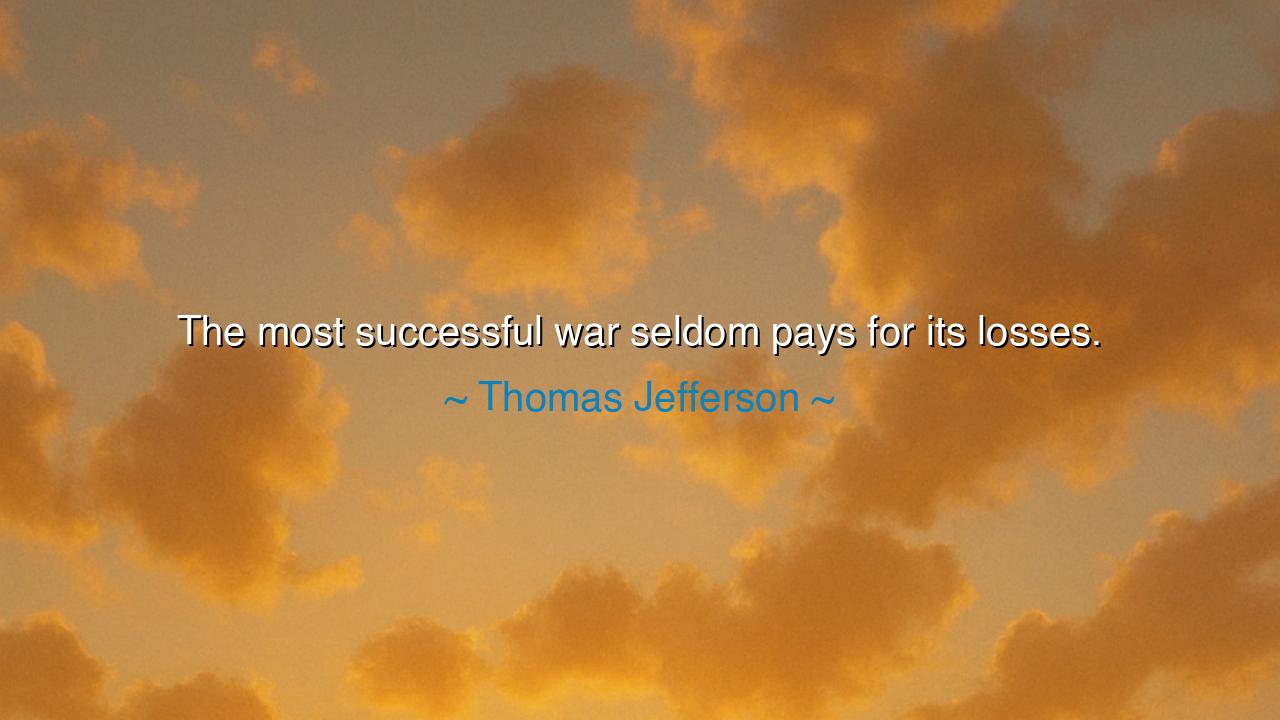
The most successful war seldom pays for its losses.






The sage of Monticello, Thomas Jefferson, once declared with solemn gravity: “The most successful war seldom pays for its losses.” These words are not the whisper of weakness but the roar of wisdom, born from a mind that had witnessed revolution, bloodshed, and the price of liberty. Jefferson, though a leader of a nation birthed in war, saw clearly that even when a cause is just and the victory secured, the true cost of conflict is rarely redeemed. For the losses—in lives, in treasure, in peace of soul—are treasures beyond price, and no triumph can fully restore them.
This truth is older than any republic. For every successful war that carved out kingdoms or secured freedom has also left behind shadows that stretch across generations. The slain do not rise when the treaties are signed. The burned fields do not instantly yield harvest when the banners of victory are raised. The children orphaned, the families broken, the scars of body and spirit—these are debts that no plunder, no territory, no glory can ever repay. Jefferson unmasks the illusion of triumph: victory may crown the head of a nation, but it does not heal the wounds carved into its heart.
Consider the tale of the American Civil War. The Union was preserved, and slavery was ended—great achievements indeed, perhaps even necessary ones. Yet, did those victories “pay” for the rivers of blood shed, for the shattered South, for the bitterness that lingered for a century? The war succeeded in its goals, but the cost was so vast that the nation carried its wounds long after the cannons fell silent. Here is Jefferson’s wisdom proved: even the most necessary triumph leaves behind a debt greater than the gain.
The ancients, too, saw this truth. After the Peloponnesian War, Athens lay humbled, Sparta hollow, and Greece weakened before the rising power of Macedonia. What had been gained? Little that could justify the ruin of cities, the deaths of thousands, and the fall of a golden age. The war was “successful” in the eyes of victors, yet Greece paid more in loss than it gained in victory. Thus history speaks in one voice across the ages: war devours more than it delivers.
Jefferson’s warning is also a counsel for every soul, not only for nations. For in our personal battles, we too may fight with such ferocity that even when we “win,” the cost is greater than the prize. A friendship severed, a reputation stained, a peace of mind shattered—such are the hidden losses of conflict. To win at the price of these is no true victory. Better to seek peace, to resolve differences before they ignite, than to claim a hollow triumph that leaves the spirit impoverished.
O children of tomorrow, learn this lesson well: do not be dazzled by the false glory of victory. Ask always, when conflict calls—what will be the cost, and can the prize truly repay it? A wise man seeks not the path that brings victory, but the path that avoids ruin. The greatest generals are those who win without fighting, and the greatest leaders are those who build without destroying. Victory is fleeting, but loss endures.
Practical wisdom follows: in your life, weigh carefully the cost of your struggles. In disputes, seek resolution before escalation. In ambition, do not burn your health or your integrity for the sake of hollow gains. And in the councils of nations, let Jefferson’s words be a guide: go to war only when there is no other path, and even then, enter with sorrow, knowing that the ledger of loss will never balance.
Thus let the words of Jefferson echo like a warning bell: “The most successful war seldom pays for its losses.” Hold fast to this truth, and let it guard your steps. For the true measure of wisdom is not how well we win our wars, but how often we keep them from needing to be fought at all.






QNQuoc Nguyen
I find Jefferson’s quote to be a striking critique of the glorification of war. Even if a nation wins, the toll it takes—on its citizens, its economy, and its future—is rarely worth the victory. How many times in history has this been proven true? Is it possible to achieve lasting success without war? This quote challenges us to rethink the way we view military victories and whether they truly lead to a net gain for society.
HTPham huyen tran
Jefferson’s words force us to confront the reality that the true price of war is seldom paid upfront. No matter how successful the military outcome, the human, financial, and emotional toll often leaves a lingering, irreversible impact. How do we balance the desire for security or power with the inevitable losses that come with war? Could it be that we fail to properly weigh these costs when making decisions about conflict?
DTNguyen Duc Tien
This quote by Jefferson is a sobering reminder that, regardless of the outcome, war often leaves behind losses that can never truly be compensated. Even in cases where a nation emerges victorious, the costs can far outweigh the gains. How can we avoid this in the future? Can peace truly be maintained without the destructive consequences that come with war, or is it something we’ll always need to contend with?
HHle thi hue huyen
Jefferson’s quote reflects the harsh reality that war, even when deemed successful, often comes with irreversible losses. It suggests that the toll of war—whether in lives lost, infrastructure destroyed, or resources expended—can rarely be justified by the outcomes. How often do we overlook the long-term costs of conflict in pursuit of short-term gains? This makes me question whether we truly understand the true price of war or if we underestimate its consequences.